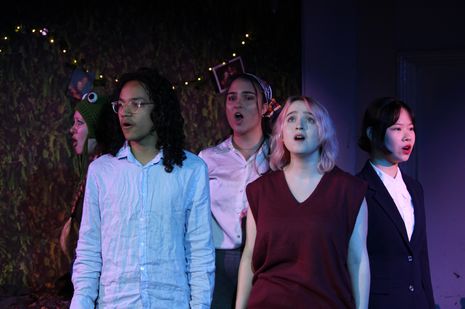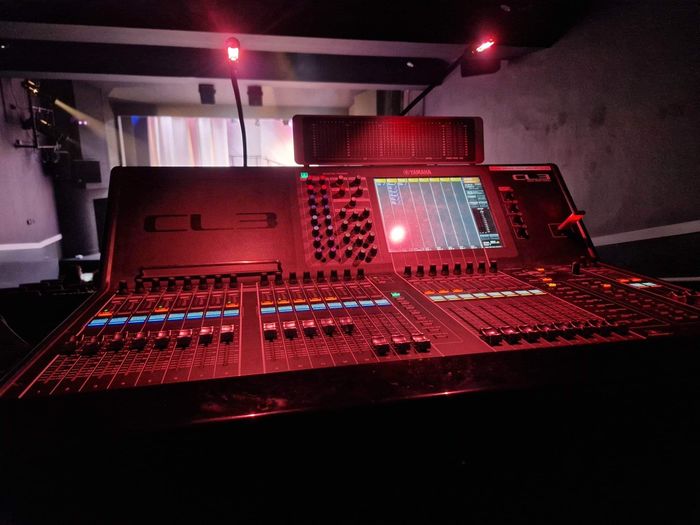The Herb Garden loses its way
This new musical entertains some interesting musical ideas but fails to form a coherent whole

The Herb Garden, a new musical by Felix Elliot, is an admirable effort to write an original score and tell a story which engages with the lives of young people. However, it often feels like an assembly of shapeless, though interesting, musical ideas.
The show struggles with ungrounded metaphors which deprive its audience of a solid emotional foundation. Sky, having been caught smoking weed on school premises, is sent to live with a teacher before Covid-19 forces them to isolate together. The eponymous herb garden references not the growing of weed but a school gardening project which serves as both punishment and opportunity for rebirth. This is problematised, however, by the story of Frog and Scorpion, two friends of Sky. In a story about identity, itself an unsteady concept, character names Sky, Frog, and Rose are implied to be representative of some natural system. However, it isn’t particularly clear what that is. In the final moments, Frog gives Sky their frog hat and introduces themself as Sky. This could be hinting at the regenerative metaphor of a herb garden, but the swapping of the hat unhelpfully complicates this. Despite this, the cyclical book is often witty, and Elliott knows how to write a one-liner.
“The cyclical book is often witty, and Elliott knows how to write a one-liner”
Music is used dynamically, with songs ending on a messy slamming of the keys, music underscoring dialogue, songs depicting two simultaneous conversations, a spiritual pan-pipe effect, a meta song which acknowledges its own limitations, and diegetic numbers. However, whilst the set design, with one wall a bedroom, another seemingly a school office, perhaps implies that the bizarre musical numbers are taking place inside Sky’s head, there isn’t much else to suggest this beyond the fact Sky likes writing songs. The production uses its full theatrical toolbox to light the stage a variety of colours, making the show sit awkwardly between realism and something more expressionistic. Many songs don’t progress the plot, and simply depict the characters talking about the panic of, say, “isolation”, as opposed to telling the story of the characters’ experiences during it. Perhaps the songs are reflective of Sky’s drugged-up delirium. But this traps a show which wants to have real development in a dramaturgical stasis.
Almost every conversation is sung, and it’s hard to see the reason behind the few conversations which aren’t. The songs which do drive the plot forward are hindered by Elliott’s fixation on rhyme, making them, rather than revealing, concealing. Rose’s original and interesting sentiment “conversations are like constellations,” is undermined by going on to rhyme the phrase with “celebrations” and “contemplations,” suggesting the rhyme is dictating the language. This is ironic considering that Sky says “if i wrote what i knew, none of it would rhyme,” and I’d like to see the rhyme-free version. Even though they often sit uncomfortably towards the top of the cast’s ranges, some of the songs, like “Best Threesome Ever”, are melodic and charming. The final song has some especially strong harmonies, and for such an emotionally vulnerable show, it is striking to have the writer onstage playing the piano so visibly.
“The whole show is founded on a relationship we never really see”
The songs aren’t helped by the direction, however. I reckon the show would be stronger if it took place entirely within Rose’s house. The first song, in which an under-written teacher warns Sky about the risks of drugs, is presented as a classic dance number, almost channelling old Hollywood. Sure, it’s cool, but it shares no obvious connection to the drama on stage. Is Sky imagining the conversation as a dance number? It’s not clear, and this ambiguity, which could arguably be representative of the delirium of drugs, continues throughout the (often over choreographed) production. It might work better as a play: the parallel narratives feel spread thinly to a point where the effect of mirroring is lost, particularly with an unproductive subplot about Rose’s mother.
The whole show is founded on a relationship we never really see. We go from reconciliation between Sky and Rose at the end of act one to a song about the last 24 hours of lockdown at the top of act two. It’s like there’s a missing middle act, full of character development, in place of the interval. Moreover, the fact that the shared isolation doesn’t impact Rose’s eventual protection of Sky from punishment (which she does on grounds of pronoun ignorance, something Rose is conscious of from her first meeting with Sky) makes the story feel uneven. It would have been nice to get a bigger sense of Sky beyond their relationship with drugs, even if it does make a point about their lack of direction.
The Herb Garden follows too many narrative strands, and is unable to find a musical language to accommodate and enhance them. Although its sketchiness may be intentional, it is never involving or clear enough to create proper meaning.
The Herb Garden is playing at the Corpus Playroom from Tuesday 16th to Saturday 20th May
 News / Right-wing billionaire Peter Thiel gives ‘antichrist’ lecture in Cambridge6 February 2026
News / Right-wing billionaire Peter Thiel gives ‘antichrist’ lecture in Cambridge6 February 2026 News / Christ’s announces toned-down ‘soirée’ in place of May Ball3 February 2026
News / Christ’s announces toned-down ‘soirée’ in place of May Ball3 February 2026 News / John’s duped into £10m overspend6 February 2026
News / John’s duped into £10m overspend6 February 2026 News / Epstein contacted Cambridge academics about research funding6 February 2026
News / Epstein contacted Cambridge academics about research funding6 February 2026 News / Lucy Cav students go on rent strike over hot water issues6 February 2026
News / Lucy Cav students go on rent strike over hot water issues6 February 2026










